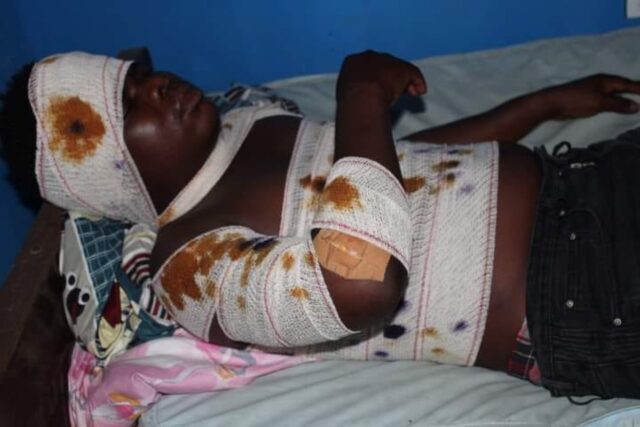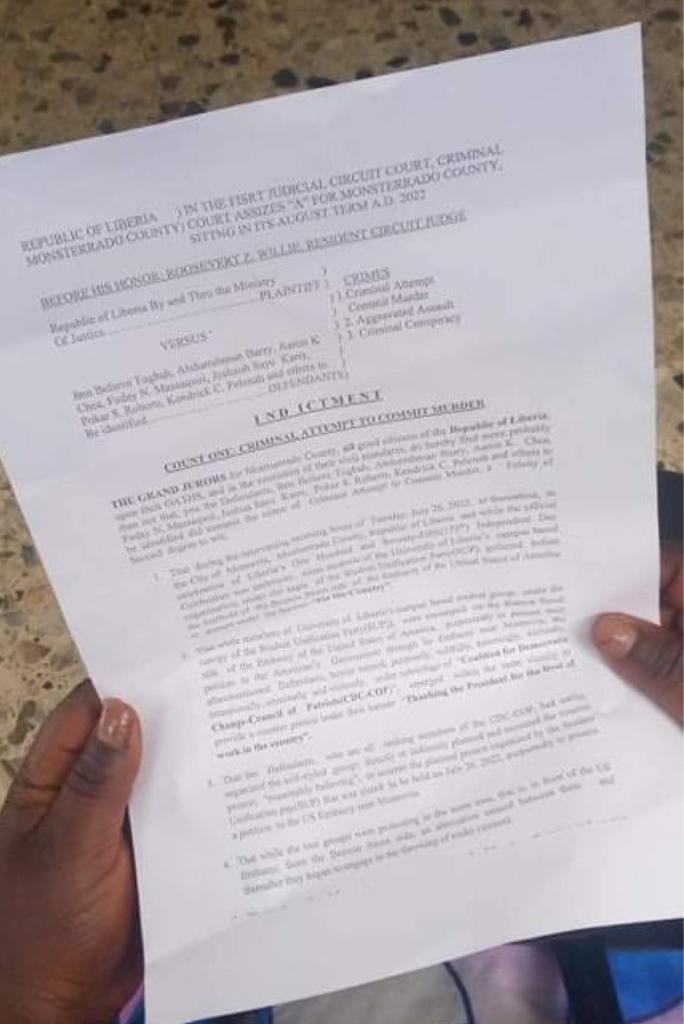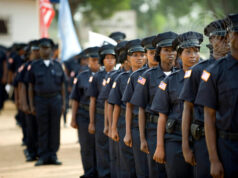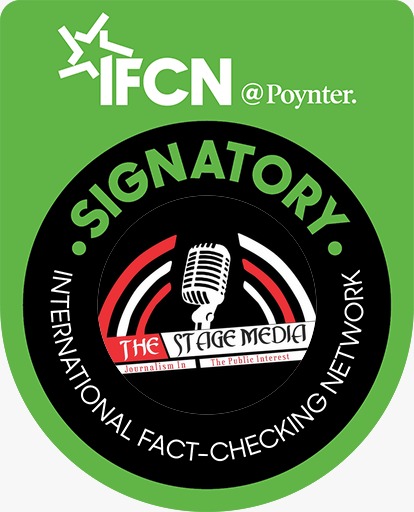
Christopher Wleh Sivili, a former student leader at the University of Liberia, is seeking justice for the inhumane treatment and torture he allegedly suffered at the hands of a splinter group of the former ruling Coalition for Democratic Change.
The incident occurred during an anti-Weah protest led by members of the Student Unification Party, a student-based pressure group, at the ceremony of Liberia’s 175th Independence Day in 2022.
On July 26, which is annually celebrated as Liberia’s Independence, Sivili and members of his SUP organized a protest under the theme “Fix the Country” to petition the American Embassy near Monrovia.
In the process, a pro-Weah group, “the Coalition for Democratic Change Council of Patriots (CDC-COP),” also gathered at the same location to protest under the banner “Thanking the President for the level of work.”
At this point, an altercation occurred among both groups, resulting in stone-throwing, at which time Sivili was affected.
A video circulated on social media shows Sivili captured by an anti-group, stripped naked and tortured until he bleeds profusely from his mouth and nose.
In reaction to the brutal July 26 saga that attracted local political parties and CSO, the Liberia National Police (LNP) launched an investigation and arrested Ben Believe Togbah, Abdurahman Barry, Aaron K. Chea, Foday N. Massaquoi, Joshua Daye Karr, Porkar S. Roberts, Kendrick C. Pelenah and others on August 2, 2023, as suspects.
After LNP concluded their investigation coupled with findings, the matter was forwarded to the Monrovia City Court with charges ranging from criminal attempt to commit murder, aggravated assault, criminal conspiracy, criminal mischief, theft, rioting, failure to disperse, and disorderly conduct.
Their lawyer, Arthur Johnson, obtained a $50,000 bond from the Sky Insurance Company to prevent them from visiting Monrovia Central Prison.
The Montserrado County Grand Jury then issued an indictment against them. A portion of the indictment said the CDC-COP senior members willfully, wickedly, intentionally, criminally, and violently emerged within the same vicinity to counter-protest, an action that led to severe SUP members sustaining major injuries and Sivili being inhumanely treated and flown out of the country for advanced medical attention.
The indictment led to Roosevelt Z. Willie, presiding judge of Criminal Court ‘A’, taking jurisdiction over the matter with the issuance of a new writ of arrest.
Ben Believe Togbah, Abdurahman Barry, Aaron K. Chea, Foday N. Massaquoi, Joshua Daye Karr, Porkar S. Roberts, and Kendrick C. Pelenah were arrested and placed on prisoner bench for hours until they were signed for by their lawyer, Cllr. Johnson.
Judge Willie restricted those seven individuals from leaving the country and instructed them to provide three human sureties to guarantee their appearance along with their passports and to sign twice a month.

The government was expected to present substantial evidence to support its allegations against the accused. The government failed to produce the necessary evidence to substantiate their claims. The failure of the government at the time was linked to the fact that the indictees were associates of the Weah administration.
The defense lawyer informed the court that since the August 15, 2022, indictment against his client, the government had not tried the case. As of October 4, 2023, the case has been at the Criminal Court for a year and two months.
In the motion filed for dismissal, the defense emphasized that when a person is indicted or has a criminal offense before a competent tribunal, they shall be tried in the next succeeding term yet the prosecution failed to do so, which violated both the statutory and constitutional rights of those defendants.
The motion to dismiss cited Section 18.2 of the Criminal Procedure Law, which states that, “Unless good cause is shown, a court shall dismiss a complaint against a defendant who is not indicted by the end of the next succeeding term after his arrest for an indictable offense.”
In resistance, the prosecution said they were unable to secure witnesses to proceed with the trial. They cited Section 18.1 of the Criminal Procedure Law, saying they shall terminate to the extent indicated in the dismissal.
Furthermore, they adhere to the dismissal without prejudice to the state. Judge Willie denied prosecution submission on 18.1 and granted Defense Counsel’s submission for the indictment to be dismissed based on 18.2 without prejudice to the state.
The judge informed government lawyers that they could re-file if they gathered the necessary witnesses and evidence to try the case. This decision freed the indictees of the initial instruction for them to appear weekly to sign the court record.
Fast forward to the transition of a new government; Sivili called for an independent investigation and prosecution for violating his human rights, urging the government of Liberia and international partners to take action.
On July 13, 2024, Sivil called for justice using both local and international media. He maintained that former President George Weah refused to serve him justice.
“The state allowed those perpetrators to walk free in the country while they grappled with the trauma that haunts them days and nights,” he said. “My mental health has been severely impacted, and the pain of injustice lingers like a shadow over my life.”
When asked if Sivili has a chance at justice with the current court action, Cllr. Lafayette B. Gould Sr., a former Special Assistant to the former Solicitor General, replied, “Yes, this depends on whether the case was dismissed without prejudice.”
Cllr. Elisha T. J. Forkeyoh, a former law clerk, said the dismissal of an indictment for failure to proceed with prosecution is not a bar to future prosecution as mandated in Chapter 18, Section 18.2 states that “18.2. Dismissal by a court for failure to proceed with prosecution.
“Unless good cause is shown, a court shall dismiss a complaint against a defendant who is not indicted by the end of the next succeeding term after his arrest for an indictable offense or his appearance in court in response to a summons or notice to appear charging him with such an offense. Unless good cause is shown, a court shall dismiss an indictment if the defendant is not tried during the next succeeding term after the finding of the indictment. A court shall dismiss a complaint charging a defendant with an offense triable by a magistrate or justice of the peace if trial is not commenced in court in response to a summons or notice to appear.” “§ 18.3. Effect of dismissal.
Forkeyoh said dismissal of an indictment or complaint under sections 18.1 or 18.2 at any time before the jury is impaneled and sworn or, if the case is to be tried by the court before the court has begun to hear evidence, shall not constitute a bar under the provisions of section 3.1 to a subsequent prosecution.”
“This means that the state if it deems it necessary and it’s ready to proceed with prosecution, may draw out a new indictment and pursue the prosecution of the accused in keeping with the law.”
Mr. Susulu may get justice if the MOJ pursues the case and resubmits the indictment to the Grand Jury.
He continues, “As a matter of law, there is currently no case before the court because, according to you, the previous indictment was dismissed. The dismissal of an indictment removes the case from the docket of the court. In this case, without prejudice. The resubmission of the indictment and approval therein by the Grand Jury through a True Bill places the case on the docket of the court, and the accused would be rearrested in keeping with the law. This sets the trial basis.”




